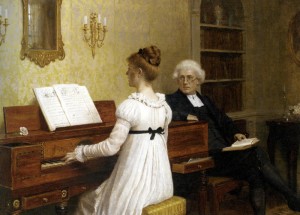
Leighton Edmund Blair – The Piano Lesson
It is very interesting as a teacher to find out what kind of repertoire makes students tick. For example, I find that boys tend to prefer lively, rhythmic, jazzy music. Other students like music with clear melodic lines and scope for expressive playing. I encourage my students to develop their musical taste by exploring a variety of repertoire and suggesting music for them to listen to as well (easy to do since many of them like to use YouTube or music streaming services), but I also encourage them to learn music which is outside their normal comfort zone to enable them to explore different technical and musical challenges. Of course, if they really dislike a piece there is no point in continuing with it as there is no pleasure or usefulness to be gained from playing music you don’t enjoy.
Interpretation is a far more complex area, and more advanced/mature students and adults often have firm ideas about interpretation, either based on their own musical experience or their listening, knowledge and appreciation of music. Sadly, I have come across teachers who try to impose their own interpretation on students, sometimes to the extent that they seem to want the student to sound like they do: in such instances, this, to me, seems to be nothing more than an exercise in self-aggrandisement. It serves no real pedagogical purpose, nor does it allow the student to develop their own musical voice. (As the pianist Stephen Hough observed in one of his articles, he would be worried if he listened in a class of students at a conservatoire to discover that they all sounded identical to their teacher.)
Kabalevsky: 30 Children’s Pieces, Op. 27 excerpts
The majority of my students are now intermediate and early advanced level players who are beginning to be able to make their own judgements about interpretation in their pieces based on their ongoing musical development and knowledge. In this case, I feel my role is to guide them into making decisions about interpretation which are stylistically in keeping with the genre and period of the music they are working on, faithful to the score, and also tasteful. However, I would not dismiss a more romantic reading of the music of Bach or Scarlatti, for example, provided the interpretation offered is consistent and convincing.
Fundamentally, our teaching should be about imparting our musical values rather than our preferences, and encouraging our students to be curious, open-minded and non-judgemental. In addition to offering them a wide variety of repertoire, we should also be encouraging “listening around” the music they are studying to familiarise themselves with, for example, the very distinct soundworld of Chopin, as well as what I call “lateral listening” – a case of “if you like this, why not try?”, which I use with students who enjoy the music of Ludovico Einaudi (I encourage them to sample the minimalist music of Philip Glass and Michael Nyman). Thus students can develop their own individual tastes and opinions about the music they are playing and enjoying.
Philip Glass: Etude no 5




